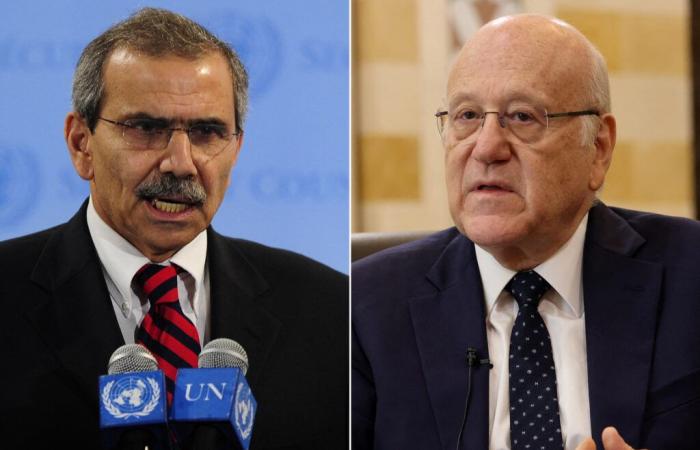Beirut- Today, Monday, the binding parliamentary consultations that Lebanese President Joseph Aoun is conducting with the parliamentary blocs to name the new prime minister began, in preparation for assigning him to form the next government.
This comes at a time when the race for this position is witnessing intense competition between the most prominent candidates: Najib Mikati, who enjoys the support of political forces, most notably the Shiite duo Amal Movement, Hezbollah, the “National Moderation” bloc, and Nawaf Salam, who is supported by the opposition forces.
The last hours witnessed the withdrawal of both Ibrahim Mneimneh and Fouad Makhzoumi “to make room for agreement on the candidate Salam,” according to their statements.
Possible option
Mikati has been prime minister since 2021, and held this position three times previously. The consultations that followed the resignation of Hassan Diab’s government in the same year gave him 72 votes, far superior to his competitors. While Salam received a single vote from MP Fouad Makhzoumi.
Mikati assumed prime minister for the first time in 2005 following the assassination of the late Prime Minister Rafik Hariri, and was then appointed to the position in 2011 and 2021.
The name of Mikati (the current Prime Minister) has returned to the forefront as one of the most prominent candidates to assume this portfolio in the next stage. This scenario remains likely unless the opposition, independent and change forces – with the support of the Free Patriotic Movement and the Progressive Socialist Party – are able to agree on a unified candidate who enjoys the support of the parliamentary majority.
On the other hand, Salam stands out as a candidate supported by the independent and change representatives, who combines the experience of a judge, diplomat, and academic. He served as Lebanon’s ambassador to the United Nations for a decade, and was a prominent representative of his country in the UN Security Council. In 2018, he was elected as a judge at the International Court of Justice, becoming the second Arab to hold this position after Algerian Mohamed Bedjaoui.
At the local level, Salam contributed to the development of the Lebanese political and legal scene. He was elected a member of the Executive Office of the Economic and Social Council between 1999 and 2002, and the Council of Ministers appointed him in 2005 as a member and rapporteur of the National Authority for Election Law Reform. He played a pivotal role in preparing a draft of a new electoral law at a sensitive stage that followed the withdrawal of Syrian forces from Lebanon.
Politically, Salam’s name returned to the forefront strongly in 2020 when he was put forward as an independent candidate for prime minister following the disaster of the Beirut port explosion, as a neutral and technocratic option capable of managing an exceptional phase in the country’s history, and today his name is being mentioned again despite the absence of support from the opposition forces, which include 31 representatives.
difference
For his part, political analyst Nicolas Nassif told Al Jazeera Net that the two main candidates, Mikati or Salam, each have a different “profile” and belong to a political stage that differs from the other, as follows:
- Mikati belongs to the club of former prime ministers, which makes him part of the traditional political class that is accustomed to assuming the presidency of the government.
- On the other hand, Salam represents a new face on the political scene, as he did not hold any previous government position, but his name was put forward more than once as a candidate for prime minister.
Nassif explains that the current situation represents a decisive test among the possible options for the beginning of the new era in light of the presence of different political orientations. “The opposition supports Salam, while the other team – especially the Shiite duo – is moving towards supporting Mikati, with the possibility of Walid Jumblatt joining them.”
According to him, this expected government represents a real test of the new era and its launch, and he stresses that President Aoun must seek a single formation that “is different from the national unity governments that Lebanon was accustomed to in the past, because they were coalitions based on quotas and sharing positions.”
He added, “These governments did not reflect the will of the state as much as they reflected the will of the political parties, so the challenge remains before President Aoun in forming a constitutional government that resembles the speech he delivered upon swearing in, a state government in every sense of the word.”
The decisive stage
For his part, university professor and political activist Ali Murad believes that this day will be pivotal, “as matters will continue to develop until the last minute to determine the position of Jumblatt and Gebran Bassil, which may constitute the decisive factor in the battle.”
He added to Al Jazeera Net that some of the votes that were expected to be in favor of Salam are not moving towards this option “due to the great pressure being exerted in the country.”
According to Murad, “It is unhealthy to believe that Salam’s arrival to power will disrupt political balances. This contradicts democratic principles, and is a violation of the idea of respecting people’s choices and imposing unjustified pressure.”
He considers that “naming Salam, with his personal values and international presence, gives him the ability to lead the reform battle, and that this is in line with the discourse of the New Testament and the reform trends expressed by the President of the Republic.” He stresses that “everyone must respect the results of consultations.”
In his opinion, Mikati’s arrival to head the government constitutes an obstacle to the new era due to the political and partisan intersections it carries, and he explains, “We have witnessed how the Mikati administration’s reforms have been over the past two or three years, and we have noticed his clear connection to Hezbollah and his choices during the war, and although Mikati in 2025 may be… More able to adapt, but this step remains inappropriate for the Lebanese, as it reflects the return of old faces that this era does not need.”






